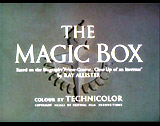
|
The Magic Box (1951, UK)
In director John Boulting's biopic drama with two
major flashbacks (one from a second wife's point of view, and one
from the POV of the main character) - about a British pioneer in
cinematic history:
- the extraordinary moving sequence in which the
pioneering, British inventor of the movie camera - obsessed photographer
William Friese-Greene (Robert Donat), urged a helmeted Police Constable
94-B (Laurence Olivier) passing on the street to come up to his
room - he spoke excitedly to the Constable: ("Come quickly!
Come on, come and see...I've got something to show you, something
I've done. You must come and see!..I feel I've simply got to show
someone")
- inside the apartment, the inventor instructed the
wary Constable to sit down for a demonstration, and to turn out his
flashlight ("lamp"); then he was told: "Now, watch
that white sheet" (a hanging white cloth sheet), although the
Constable nervously grabbed for his nightstick; Friese-Greene began
to proudly show off his first triumphant film screen projection;
he started to hand-crank his device (with a loud mechanical clicking
noise), to display 'moving pictures' of Hyde Park taken during an
afternoon visit; after the brief demonstration, the Constable was
amazed and dumbfounded - he remarked: "That was Hyde Park. I
recognized it. Where's it come from? And where's it gone to?" -
he looked behind the white sheet
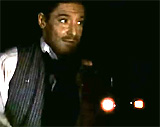
|
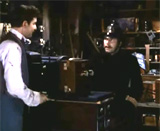
|
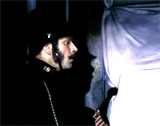
|
|
Friese-Greene Hand-Cranking the Projector
|
Constable: "That Was Hyde Park. I recognized
it"
|
Looking Behind the White Sheet 'Screen'
|
- Friese-Greene's answer as he pointed at his marvelous
machine: "It's all here. Here, look! That's where the Hyde
Park you saw is. Like a magic lantern"; he then explained
the principle of the 'moving' pictures, including the development
of a strip of celluloid film over many years and other technical
details: ("Yes, it moved, didn't it, ha? Now look, look at
this strip of celluloid film. It took me years to get to that.
Years. That's the secret. Dozens of snapshots of Hyde Park. That's
what it's called. It comes from this spool over these rollers,
that's for tension. You've gotta have tension, under this second
spool down here. Now, look in the middle. It's a bit like a magic
lantern, but instead of one picture at a time, you see eight or
more pictures every second, and that's what you see on that sheet
there. Eight pictures every second, and they're all merged together
into one moving, living picture! See? Ha! Of course, there's a
bit more to it than that, that! I'm not saying it's perfect. Far
from it, but it works! God be praised. It works, doesn't it? You
can see that" - he became tearfully joyful about his accomplishments: "You
know, it's a quite extraordinary feeling, something you've been
wondering about and dreaming about for 15 years. And then, all
of a sudden, it's there. It's in your hands, with a life of its
own")
- the Constable made a congratulatory exclamation:
("You must be a very happy man, Mr. Friese-Greene")
- in the film's conclusion, set in 1921 at a London
film industry business conference, the aged and impoverished Friese-Greene
delivered a short speech in front of the audience: ("Gentlemen,
I am not a businessman, no.... You know, when this business was a
fairground sideshow, I suppose you could only speak of it in terms
of pounds, shillings, and pence....Only a few of us could see then
it would become a sort of universal language, and it has become that,
you see. And this universal language that could say great things
- oh dear, it so often babbles and drivels so foolishly. It does,
you know. I mean, that in time, the world, well, it'll tire of it....If
the film does not grow up with its audience, then it will die. You
know, it's only in the nursery that children fight and destroy the
things in their hands. The film is in your hands, and you may not
behave like children. YOU MUST NOT DESTROY IT! Don't! It's, it's
very easy to be good businessmen. It's so difficult to grow up. So
difficult, and --- and so, I ask you, I - ask you to work together.
All my life, gentlemen, I - I have tried. There's so much to hope
for, so much. There is - I have tried"
- when he meandered and became incoherent, Friese-Greene
was forced to return to his seat, where he became delirious (hearing
voices from his past), collapsed onto the floor and died; a film
canister fell to the floor from his hands; as his pockets were emptied
of their contents, the items were placed on a table: his film canister,
spectacles, a pawn ticket for some cuff links, a prism, and "one
and ten pence - just the price of a seat at the pictures"
|
Friese-Greene's Final Speech Before His Death
|
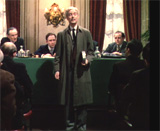
|
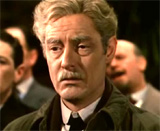
|
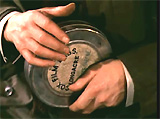
|
|

William Friese-Greene (Robert Donat)
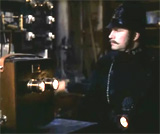
A Demonstration For Police Constable
94-B (Laurence Olivier)
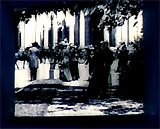
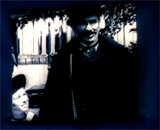
Screen Projection of a 'Moving Picture'
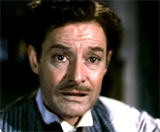
"And then, all of a sudden, it's there"
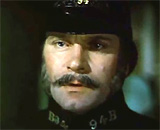
Constable: "You must be a very happy man..."
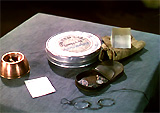
After His Death - The Contents of His Pockets
Were Set on a Table
|








